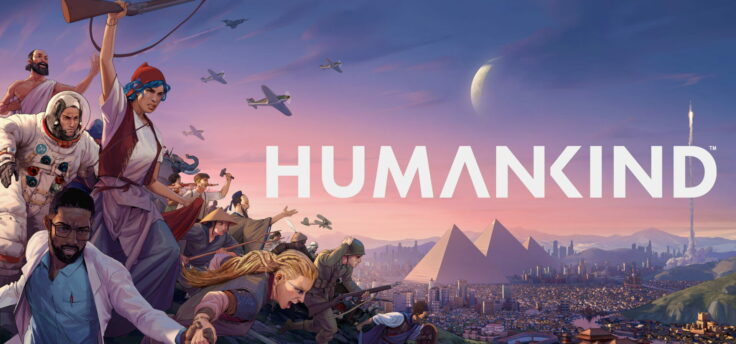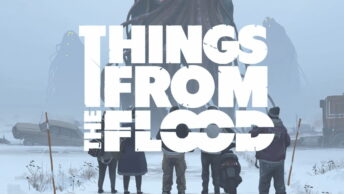Endless civilization
Type: Singleplayer, Multiplayer
Genre: Strategy
Developer: AMPLITUDE Studios
Publisher: SEGA
Release date: 17 Aug, 2021


Amplitude Studios’ magnum opus, that’s how they describe this game. Humankind is a 4X (eXplore, eXpand, eXploit, eXterminate) strategy game where you’re trying to lead a civilization from the Neolithic age to just past the present day, through military expansion, scientific discovery, trade and diplomacy. Your goal is not just to survive, but thrive and outshine any other civilization that exists on the planet.
That description could fit several games, most notably Sid Meier’s Civilization and its many sequels. Humankind does a lot of things similar to the Civilization series, but in some regards it’s more similar to another game, Endless Legend, which Amplitude released in 2014.
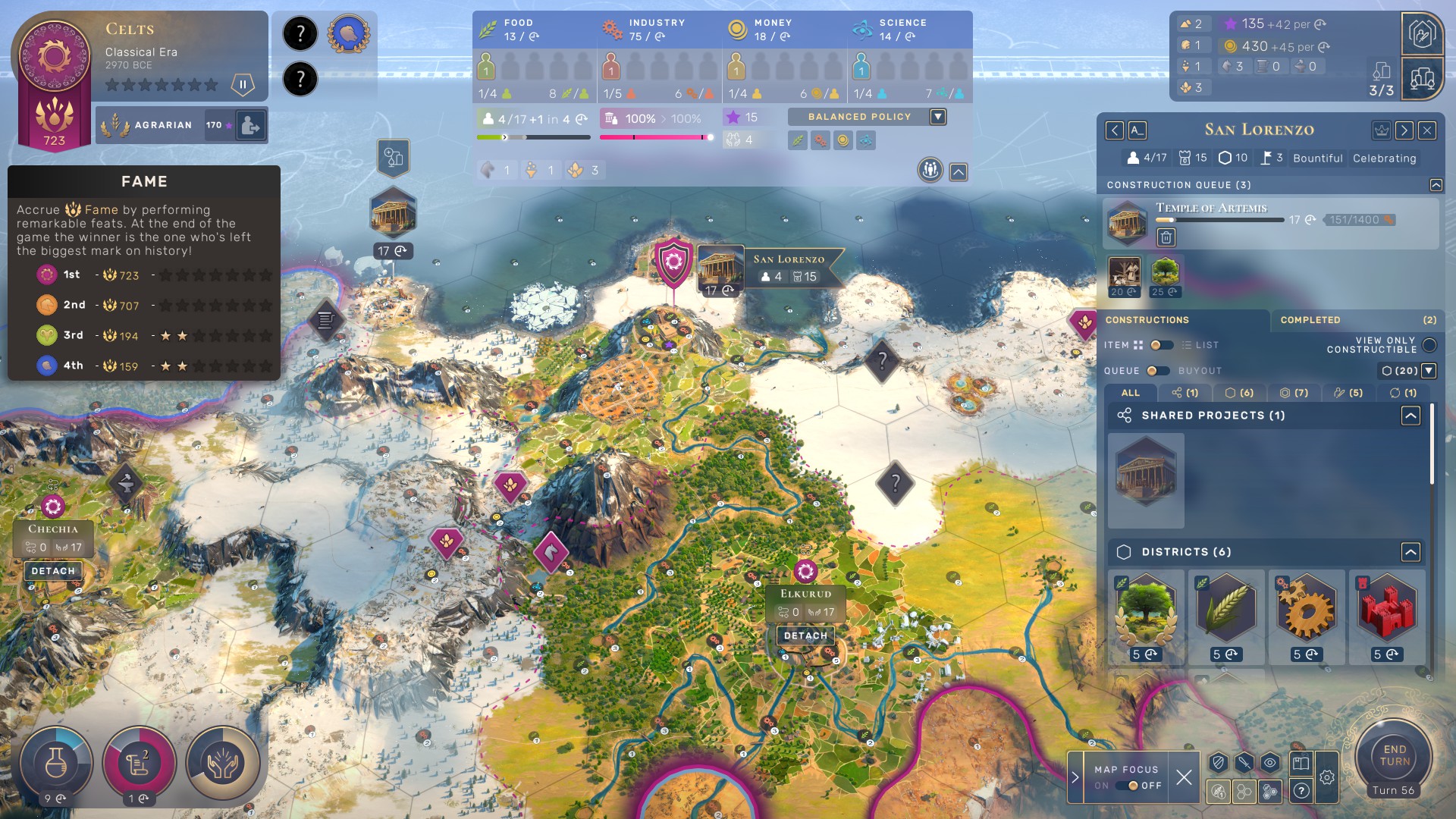
Storytelling
A game like Humankind is not particularly story focused. There’s no pre-written narrative running through the game, no quests that adds story flavour or anything of that nature. It is a game where you make your own story, as your civilization expands, clashes with its neighbours and tries to prosper.
Humankind makes a few different assumptions than most other civilization building games about what a civilization is though. In Sid Meier’s series you start the game by picking a civilization that you’ll lead through the millennia, which creates some wonderfully anachronistic situations, like ancient Babylonians existing together with nearly current day Australians. Humankind on the other hand does not let you pick a civilization when you start the game, instead as time passes your civilziation will evolve and change, and as you enter a new time period your civilization will at the same time also change with it. Each era has its own “cultures” as the game calls them, and when you advance to a new era your culture will change. In ancient times you might play as the Babylonians or the Hittites, and as you move into the classical era you can choose to play as say the Achaemenid Persians, the Greeks or the Romans, or you might choose to doggedly stick to your old ways and not evolve with the time. This system creates its own weird things, like the Greeks suddenly turning to Aztecs or Khmer, but it does show how a culture changes over time in a way that few other games do. Your civilization might go from a group who values science and progress highly to a warlike people as the world changes around you.
The game is not devoid of any kind of writing though, and while the story is one that’s created when playing there are snippets of text here and there. Each new piece of technology has a short description for an example, and the writing is overall pretty good with these. There’s also a somewhat sarcastic narrator who will comment on big events, like when you change to a new era or do something else for the first time. The narrator is used sparingly enough that he does not get annoying, though he could really have used a few more voice clips for when you reach the end of an ideology.
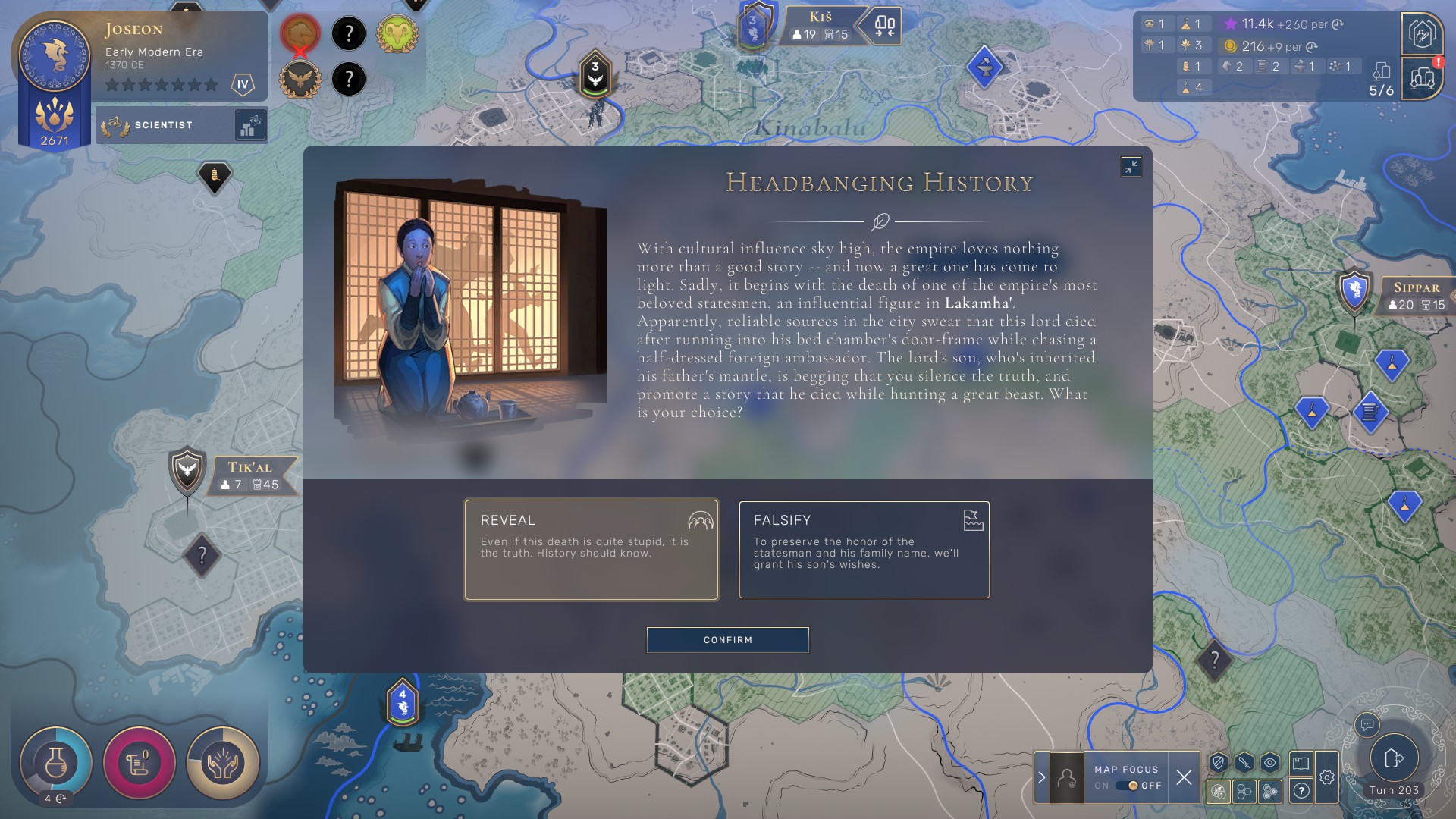
Presentation
Humankind is a decently good looking game, though it’s not up there with the very best of them. The overland map looks pretty good, with varying terrain that often has a distinct look. Cities sprawl out over the maps and change the terrain with them, and great wonders act as massive landmarks. Colours are often warm, which gives the game an inviting and slightly stylized look. When things are viewed from a distance, this is an attractive looking game.
Zooming in reveals some rough edges though. Units and buildings have a low polygon count, which is good for performance, but it does not look so great up close. And you will end up seeing these things up close at times, as every time you change era the game will zoom in and show how your cities change to reflect the new era
Units are somewhat stylized as well, and with a few exceptions it’s not particularly hard to tell even similar units apart from each other at a glance. Sometimes they might have bold colours, sometimes they’ll have some other distinguishing feature such as feather plumes, the designs did a good job at making different units look distinct.
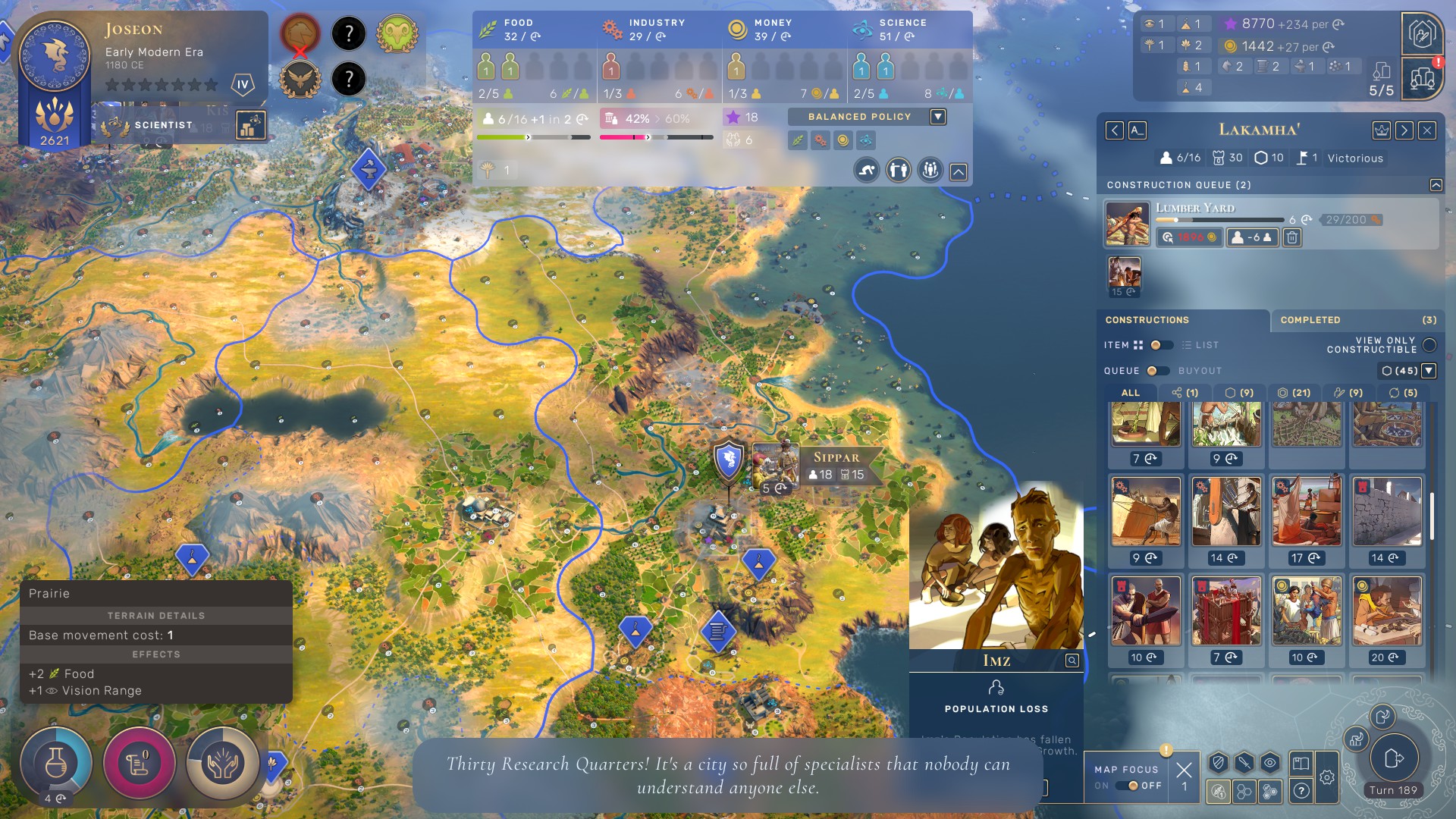
Some of the 2D art is great. When advancing to a new era you’ll get to pick what culture you want, and each culture has its own picture. These pictures both say a lot about the culture, and also look really good in their own right.
The graphics might be fine, but the soundtrack is excellent. The soundtrack is in total about 1.5h long and has a good variety of songs that somehow manages to capture instruments and styles from all over the world and yet sounds coherent. It also mixes in vocals at times, though not in a distracting way, and works well as background music. The soundtrack changes as the game progresses through the eras and roughly matches the tone of any given era. One area where it could have been improved would have been if every culture got its own song, but that would also have greatly increased its length (there are 61 cultures in the game, if you include the Neolithic starting culture).
Apart from the soundtrack the sound design is pretty decent. It’s not intrusive and gives good feedback when you do things like moving units, placing new districts or just clicking on things. The sound design simply works well with the game, but not in a way that stands out. As for the narrator, his voice fits the tone they went with for the narration. It’s slightly sarcastic but it never comes off as mean.
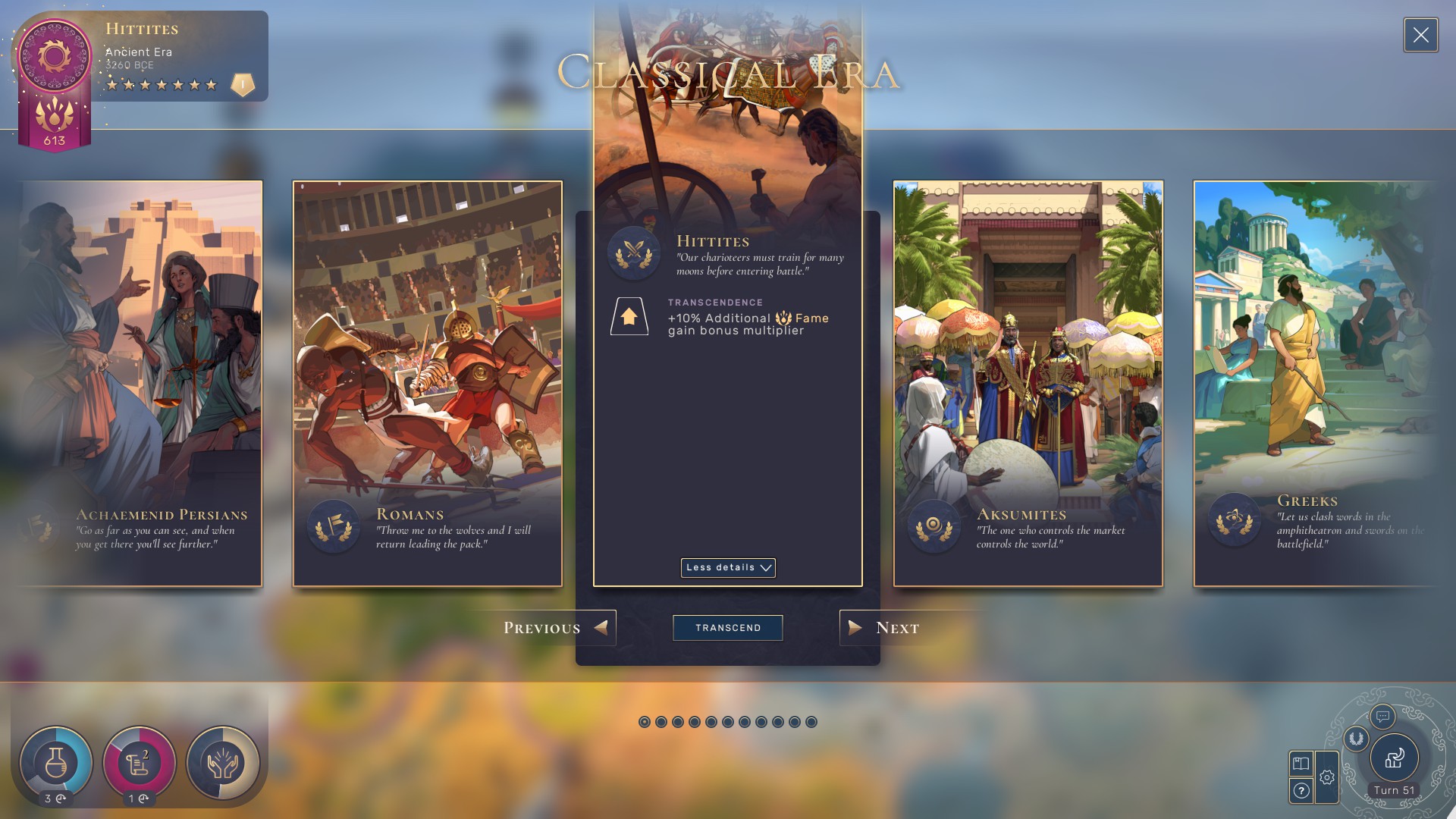
Gameplay
With a game like Humankind gameplay is what really matters. Some games might get away with offering so-so gameplay but lots of eyecandy, but a 4X game really can’t. They need enough depth and substance to justify repeat playthroughs.
Humankind is in some ways a weird 4X game. The Neolithic era, which is the starting era, is completely different from anything that comes after. It sees you control bands of hunter-gatherers, who try to find food and discover things about the world around them. At first you only have one “unit” but as you find food by picking berries, hunting deer and mammoths and so on the tribe grows and you’ll gain more units. After a while it’s time to settle and build your first permanent city, and that’s when the game really starts.
With your first city settled it’s time to do all the things you would expect to do in a 4X strategy game. Settle more land, fight your neighbours (though you could in theory start fights in the neolithic era), research new technology and try to grow your population. The first choice you’ll make in the new era though is what culture you want to follow. There are ten different ones to choose from, split between seven different “affinities”. Each affinity has its own focus, be it builders who are better at constructing new buildings and districts, expansionists who are good at claiming new territories or scientists who excel at researching new technology. Cultures with the same affinity are not identical though, and they’ll have different bonuses, as well as special districts and units unique to them. The Olmec and Zhou for an example are both considered to be “Aesthete”-focused (focused on generating influence, which is used to claim new land and change what your civilization values), but where the Olmec more directly generate influence, the Zhou instead increase the stability of their cities, their unique districts are also different as the Zhou has one that generates more science and stability, while the Olmec has one that generates more food and even more influence, and finally their units have little in common, the Olmec have a javelin thrower that excels in forests while the Zhou have a hard hitting chariot unit that charges into melee. The same trend is true for all cultures in all eras, even those that at first glance look similar tend to be quite distinct. Also, no two civilizations can have the same culture, so if you advance early you’ll have first pick.
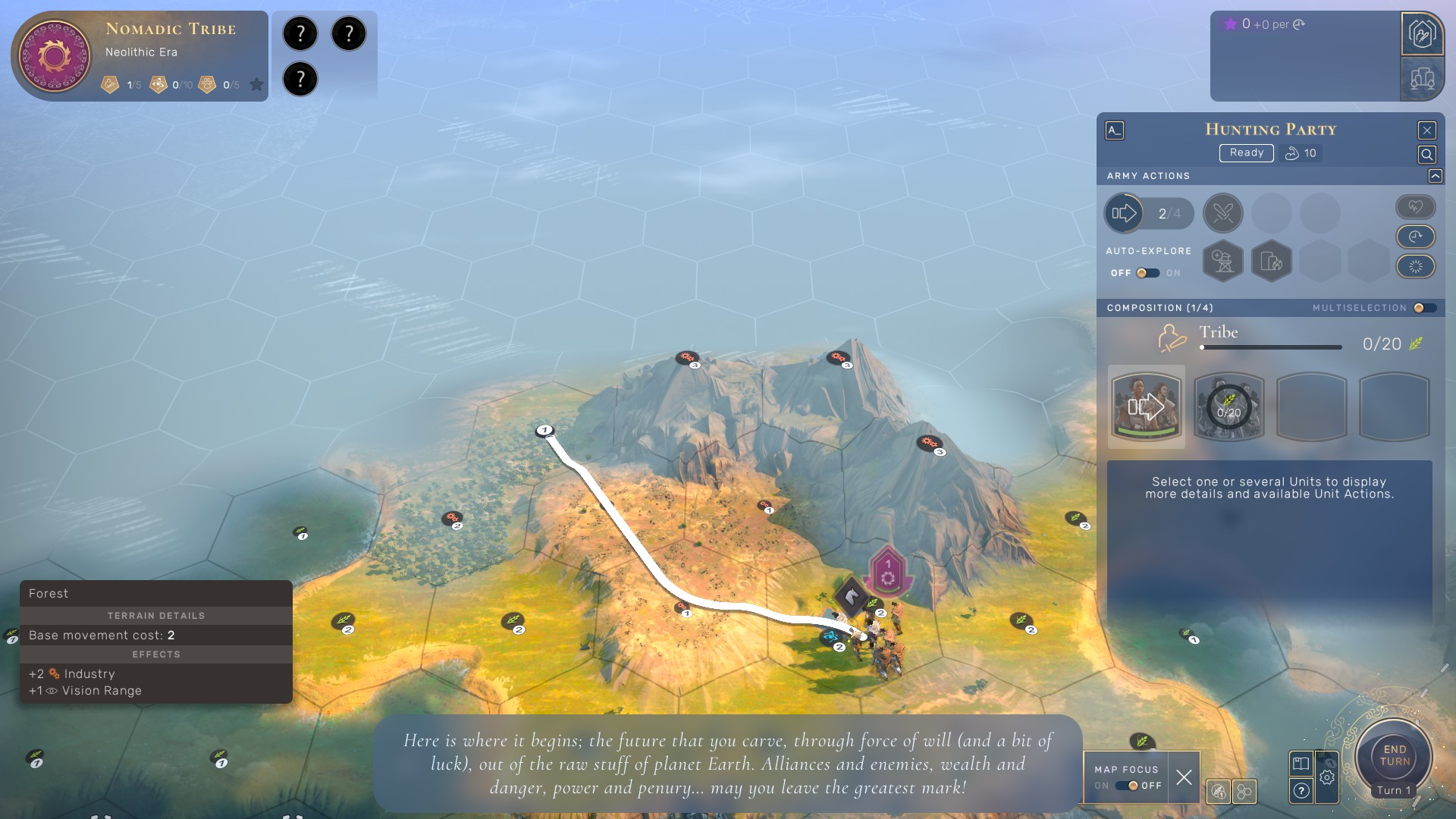
With your chosen culture, and a growing city it’s time to start expanding, and a lot of things should seem immediately familiar to anyone who’s ever played a Civilization game before. You’ve got a tech tree with technology that either give you access to new buildings and units, improves existing ones or give you different bonuses. In your city you can build new structures and recruit new units, and you need to balance your population distribution in the city so that it grows and contributes to your ever expanding empire. Your units can be used to claim new land and of course fight any other empires that happens to lay claim to the land that you view as rightfully yours.
It’s with city and territory management that it becomes obvious that this is a game made by Amplitude and not Firaxis, as this works more like Endless Legend than Civilization. The map is split up into territories of varying shapes and sizes. Each territory can have a single city or outpost in it, and the different territories usually have some kind of dominant biome. Outposts are used to extend your area of influence and lay claim to valuable resources, though they’re not fully fledged cities and can’t produce new units or buildings beyond buildings on resource nodes. Outposts can be linked to cities though, which expands their usefulness and provides support for the city.
As for the cities themselves, this is where things get more interesting. Cities can produce one thing at a time, be it a unit, a new structure or a new district, or work on a collaborative project with other cities. Structures are the most straight forward, once built they give a passive bonus to the city of some kind, usually in the form of increased production or lowered unrest. Districts are more interesting, with these your cities can start sprawling out. Districts are focused on one resource, and will gather that resource from its surrounding. A district that produces food will for an example also take food from its surrounding, while one that is focused on production will gather production. Different kinds of terrain provide different resources. Every culture also has its own unique district that acts as an improved version of one or more of the regular ones, usually with some kind of additional bonus, that you can build as long as you don’t change to another culture (old districts will still remain though, even when you switch to a new culture). Districts come with the drawback of increased unrest though. Cooperative projects are major projects that are built in a city, but other cities can help building it. These tend to be expensive things like wonders or the space program. Sharing work on specific projects is a pretty neat idea, and it makes it feel more manageable to build these where they’ll be at their most useful, even if the city itself might not have the highest level of production.
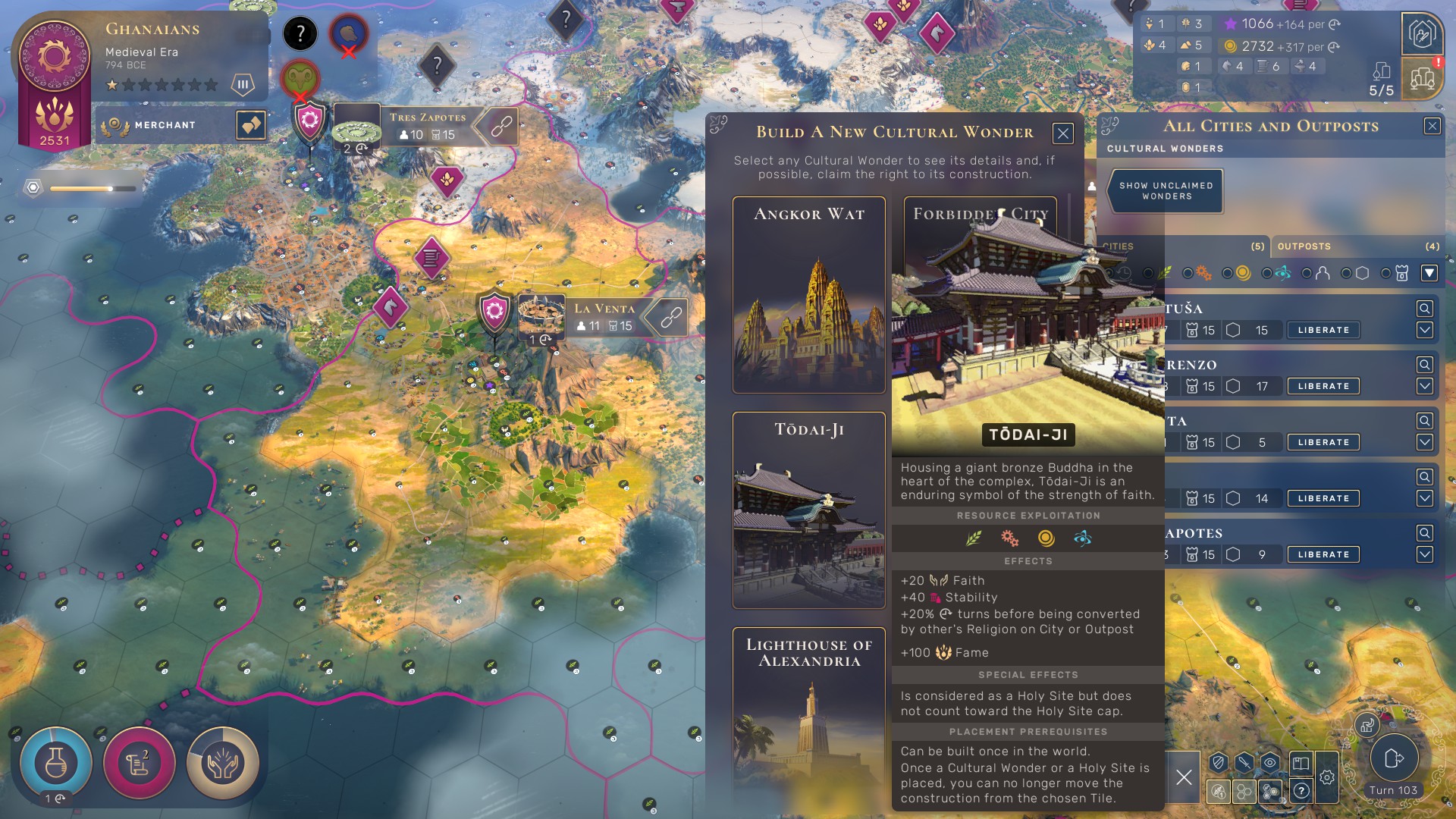
Each city produces 5 different kinds of basic resources, food (for population growth), production (is used to build things), science (speeds up research), money (used to pay for unit upkeep and speeding up construction) and influence (used to claim new land and change policies). You can assign people to produce the first four, while the last one, influence, is only produced by buildings and districts. Early in the game it’s common for cities to just produce maybe a dozen or so units of any given resource, but towards the later parts cities will regularly produce several hundred of them. Apart from the basic resources, cities can also produce strategic and luxury resources. Territories will usually have a few resource nodes that produce specific things, like oil, horses or gems. These are then harvested by specific districts (outposts can also produce these resource harvesting districts). Luxury resources gives the empire a passive bonus of some kind, specific to each kind of resource, while strategic resources are used to make units or buildings. Strategic resources are not spent when you produce a unit, but you need to have a certain amount available. Early cavalry for an example might only need a single district producing horses, but a later game cavalry unit might need three.
In order to claim new land, or fight enemies, you need military units. These then move around the map in groups (exactly how large these groups can be depends on your tech level), and having a mix of different units is usually a good idea, as different units have different strengths and weaknesses. During peace time units can be used to explore the map and produce new outposts (which can then later be turned into cities), but during wartime they’re used to fight the enemy. When two units bump into each other it’s time to fight, and you have the choice between fighting a tactical battle or let the game auto-resolve the battle for you. The tactical battles are, to be frank, pretty mediocre, and too time consuming, but it’s here where it becomes obvious why you need a good mix of units, as say a unit of just archers can easily be overwhelmed by faster enemies, so having a few spearmen in front might be a good idea. The tactical battles work similarly to Endless Legend, and that game also had pretty mediocre tactical battles.
You might have mastered the art of tactical battles, but if the enemy has tanks and you have shirtless guys who throw spears, you’re in for a bad time. This is why it’s important to keep up with your research. The research system in Humankind is nothing special, you’ve got a tech tree with different research fields, and each thing you research give you access to new things, be it new units, structures or bonuses. You usually have a choice between a couple of things that you can research, and you need to research previous things in the tree to get new ones. It works, though it has been done better in other games.
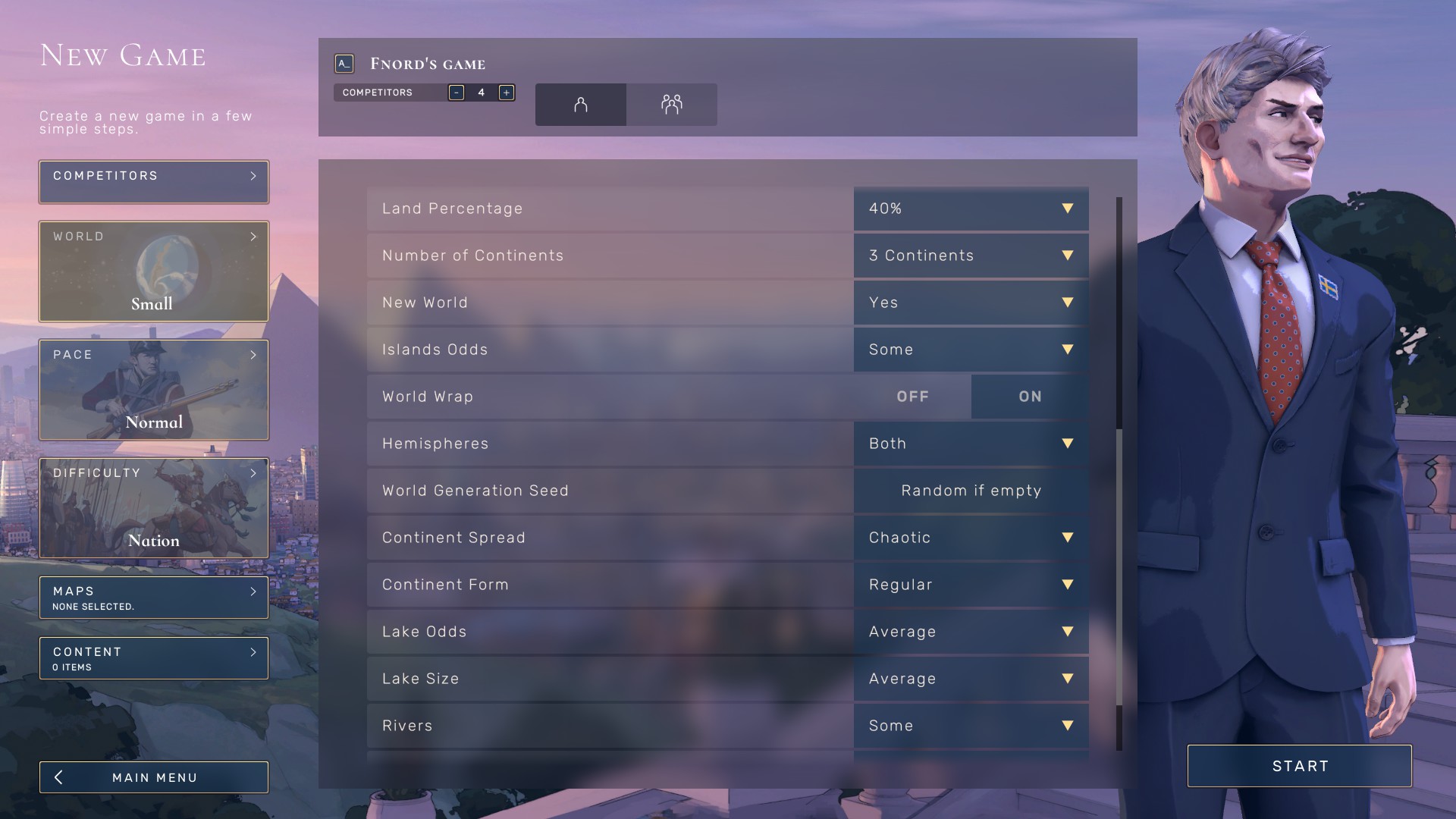
All of the above things, research, expansion, production and fighting, helps you advance to a new era. In the top left corner of the UI you’ve got a series of stars, and once you’ve filled all of them you’ll advance to the next era, where you can choose a new culture. You get these starts from doing things, be it research new technology, killing a certain number of enemies, getting a lot of money and so on. How many will depend on how late into the game you are, and how many stars you’ve got of a certain type previously in the era. You can get a total of three stars of any given type, so you can’t just focus on a single thing and just do that, though you’re encouraged to do the thing your culture is focused on, as that wins you the most fame. This creates an interesting balancing act, as advancing through the eras quickly will help you grow stronger, but you also want to try to get as much fame as possible.
Fame is the main scoring system for Humankind, and the main way you win the game. Getting era stars gives you a chunk of fame, but so does other things, like being the first civilization to circumnavigate the globe, owning entire continents, reaching the end of the tech tree and so on. Many of the special things that gives fame only count for the first civilization to do it. The circumnavigating the globe thing for an example is exclusive to the first person doing it. You can also win by conquering all the other civilizations or creating a space colony, but getting more fame than anyone else before turn 300 seems to be the main developer intended win condition.
There are a few other mechanics that comes into play during the course of the game that feel somewhat under-developed. Religion is a big one. You’ll earn faith which lets you pick religious tenets. Like with cultures you can’t pick tenets that anyone else has picked before, and the bonuses are pretty significant, but the actual religion system feels tacked on, and does not offer a lot of depth. Another mechanic that feels under-developed is pollution. Pollution is really dangerous if it’s allowed to get too high, and much like in the real world pollution does not just harm the ones producing it, but the AI will just happily make pollution producing things with you having no real way of influencing them, and there are no diplomatic drawbacks to ruining the world (maybe the developers are trying to say something here?). The issue is that the system simply does not add much depth but it kind of frustrating to deal with.
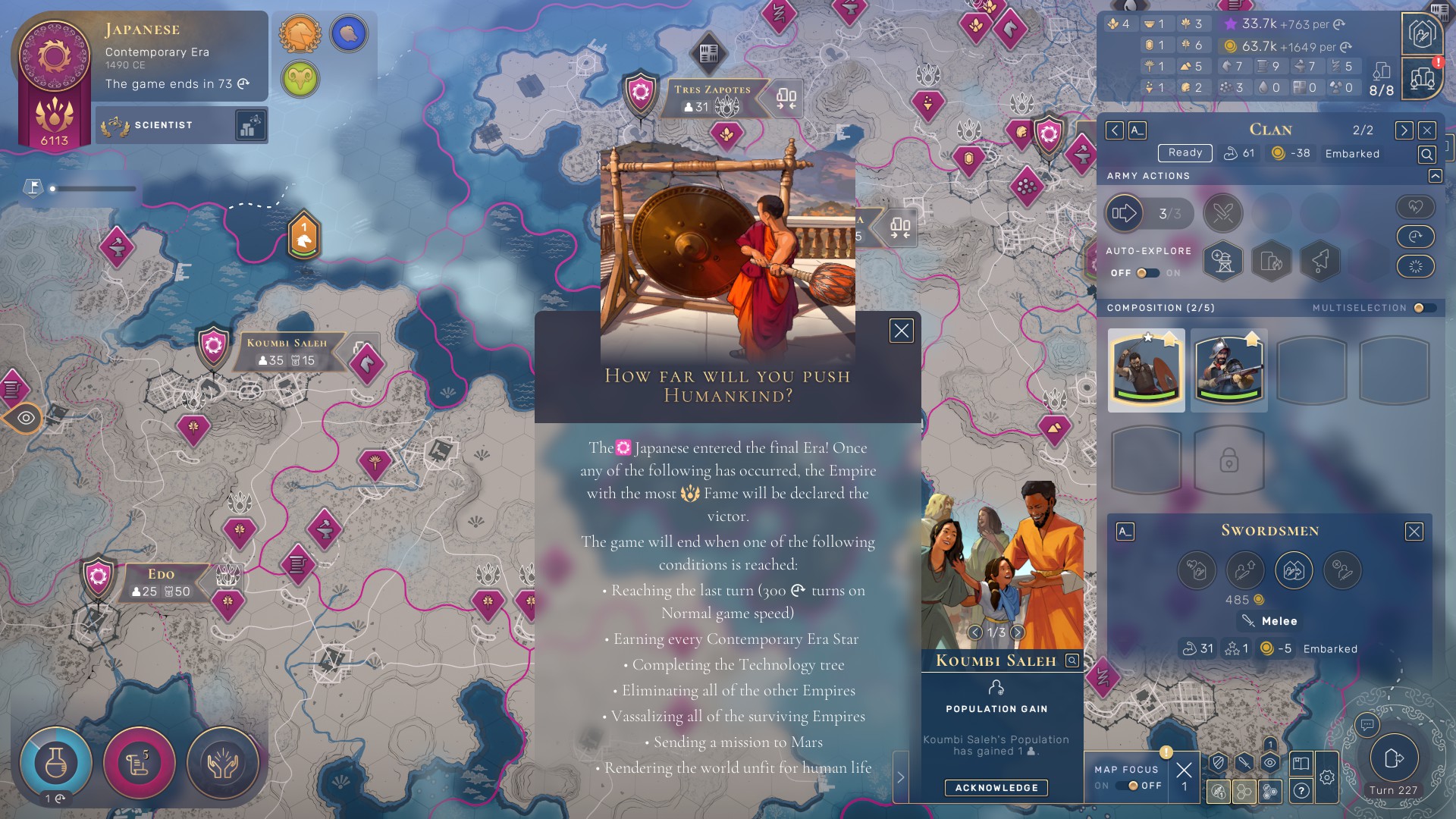
Closing Thoughts
Humankind is an impressive 4X game with a lot of things going for it, but it could maybe have used a little bit more development time. The core mechanics work well, are fun and have a lot of depth to them, but some of the auxiliary mechanics feel undercooked and end up hurting the game. Also while the fame scoring system is pretty good at forcing you to diversify it does at times encourage a slightly boring playstyle. Humankind also suffers from a similar issue to Endless Legend in that before you’ve got a good grasp of the fundamentals it can quite easily feel like all you’re doing is hitting “next turn”, while not accomplishing much. Humankind is a game that’s a lot more fun on the second playthrough than the first.
It might sound like I’m really harsh on the game there, but that’s because it’s so close to being amazing. Had they made religion more interesting, tweaked how pollution worked and maybe made the game a bit more fun for first timers this would have been the best Civ-like game on the market, but as it stands it’s “just” really good. Hopefully they can improve the game further with patches and expansions.

